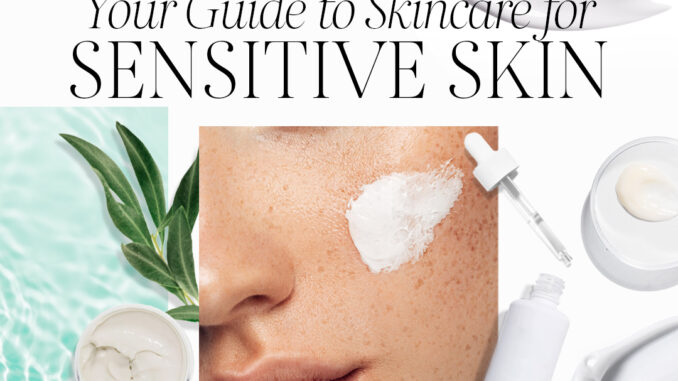
In the pursuit of healthy, radiant skin, selecting the right skincare products is paramount, especially for those with sensitive skin. Sensitive skin requires gentle, soothing formulations that nourish and protect without causing irritation or inflammation. However, with the vast array of products available on the market, choosing the right ones can be overwhelming. In this comprehensive guide, we will delve into the intricacies of skincare for sensitive skin, providing expert insights and practical tips to help you navigate the complexities and make informed decisions when selecting skincare products.
Understanding Sensitive Skin:
- Sensitive skin is characterized by heightened reactivity and susceptibility to irritation, redness, itching, and inflammation.
- Factors such as genetics, environmental aggressors, allergies, and underlying skin conditions can contribute to sensitivity.
- Individuals with sensitive skin often experience discomfort and reactions when exposed to harsh chemicals, fragrances, and abrasive ingredients commonly found in skincare products.
Identifying Triggers and Allergens:
- Before choosing skincare products, it’s essential to identify potential triggers and allergens that may exacerbate sensitivity.
- Keep a journal to track reactions and identify patterns related to specific ingredients, environmental factors, or lifestyle habits.
- Common irritants in skincare products include fragrances, dyes, alcohol, sulfates, parabens, and preservatives.
Choosing Gentle Formulations:
- Opt for skincare products formulated specifically for sensitive skin, featuring gentle, non-irritating ingredients.
- Look for labels that indicate products are hypoallergenic, fragrance-free, dye-free, alcohol-free, and dermatologist-tested.
- Choose mild, pH-balanced cleansers, moisturizers, and sunscreen with soothing ingredients such as aloe vera, oatmeal, chamomile, and ceramides.
Avoiding Harsh Ingredients:
- Read ingredient labels carefully and avoid products containing harsh or potentially irritating ingredients.
- Common irritants to avoid include synthetic fragrances, alcohol, sulfates, parabens, phthalates, and chemical sunscreens.
- Opt for natural, plant-based ingredients known for their calming and hydrating properties, such as jojoba oil, shea butter, and green tea extract.
Patch Testing New Products:
- Before incorporating new skincare products into your routine, perform a patch test to assess compatibility and minimize the risk of adverse reactions.
- Apply a small amount of product to a discreet area of skin, such as the inner forearm or behind the ear, and monitor for any signs of irritation or sensitivity over 24-48 hours.
- If no adverse reactions occur, proceed with caution by gradually introducing the product into your skincare regimen.
Consulting with a Dermatologist:
- If you have persistent or severe sensitivity issues, consult with a dermatologist or skincare specialist for personalized recommendations.
- A dermatologist can assess your skin condition, identify underlying causes of sensitivity, and prescribe targeted treatments or skincare regimens tailored to your needs.
- They can also perform patch testing to pinpoint specific allergens and recommend medical-grade products designed for sensitive skin.
Reading Reviews and Seeking Recommendations:
- Before purchasing skincare products, read reviews and seek recommendations from trusted sources, such as dermatologists, estheticians, and skincare enthusiasts.
- Online forums, social media platforms, and beauty websites often feature user reviews and testimonials that can provide valuable insights into product efficacy and suitability for sensitive skin.
- Consider joining online communities or forums dedicated to skincare, where members share their experiences and recommendations for sensitive skin-friendly products.
Considering Product Packaging and Preservation:
- Pay attention to product packaging and preservation methods to ensure skincare products remain fresh and effective.
- Choose products packaged in opaque, airtight containers to minimize exposure to light and air, which can degrade active ingredients and compromise product stability.
- Avoid jar packaging for creams and lotions, as repeated exposure to air and contaminants can increase the risk of bacterial growth and contamination.
Monitoring Skin Reactions and Adjusting Routine:
- As you incorporate new skincare products into your routine, monitor your skin’s reactions and adjust accordingly.
- Be mindful of any changes in texture, hydration, redness, or irritation, and discontinue use if adverse reactions occur.
- Gradually introduce new products one at a time and allow time for your skin to acclimate before introducing additional products.
Seeking Professional Advice for Specific Concerns:
- For specific skincare concerns, such as acne, rosacea, eczema, or dermatitis, seek professional advice from a dermatologist or skincare specialist.
- They can recommend targeted treatments and skincare regimens tailored to address your individual needs while minimizing the risk of exacerbating sensitivity.
- Prescription medications, topical treatments, and medical procedures may be necessary for managing certain skin conditions effectively.
Conclusion:
- Choosing the right skincare products for sensitive skin requires careful consideration, research, and experimentation.
- By understanding your skin’s unique needs, identifying potential triggers, and selecting gentle, non-irritating formulations, you can build a skincare routine that nurtures and protects your skin.
- Consult with skincare professionals, read reviews, and patch test new products to ensure compatibility and efficacy.
- With patience, diligence, and informed decision-making, you can achieve healthy, radiant skin while minimizing sensitivity and irritation.